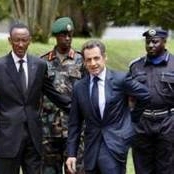French radio RFI back on the air in Rwanda
 Nicolas Sarkozy with top genocide suspect General Kagame and his officers (feb. 2010)
Nicolas Sarkozy with top genocide suspect General Kagame and his officers (feb. 2010)
Kigali – From a four-year ban in Rwanda, French radio RFI is back on the FM frequency in French and Swahili in what officials said is part of the renewed relations between Kigali and Paris.
RFI has also returned on the airwaves with a new frequency 91.9 and can be heard in Kigali since Tuesday, but tests have been ongoing since September. Listeners in other provinces also indicated they are getting the RFI signal.
�It�s with immense pleasure that RFI can rediscover its Rwandan listeners with a new offering, enriched by two hours daily in Swahili along with programmes in French�, said Genevi�ve Goetzinger Executive Director of RFI. The return of RFI to the airwaves comes during a warming of relations between the two countries.
Go�tzinger said RFI has new and more attractive programming including two hours of Swahili broadcasts for listeners in this region.
RFI was switched off by government in November 2006 following the contested indictments from a French judge against 9 top officials over alleged links to the assassination of ex-president Juvenal Habyarimana. French diplomats were expelled, as were all French interests including a school and a cultural center.
All these have since reopened following a return to normalcy in relations between Kigali and Paris which started in November last year.
With RFI FM frequency back on air, it brings to four international broadcasters with a 24-hour relay into Rwanda, including BBC, DW and VOA. Both BBC and VOA have Kinyarwanda segments ranging between an hour and two hours daily.
There are also about 10 local FM stations, along with state Radio Rwanda.
October 28, 2010 No Comments
Westerners no longer swallow my story, says Kagame
by Olivier Nyirubugara.
Rwandan president Paul Kagame has brought to the public place the increasing divergence of views between his administration and its Western partners, formerly known to be unconditional supporters.
“When one walks out, another walks in, saying: ‘I heard that you have a genocide law, a law repressing genocide. We don’t trust you. It is a way to oppress political opponents’, Kagame said on 7 October, during the inauguration of his not-changed government. He was referring specifically to former colonial power Belgium, and to the Netherlands.
In a mixture of local language Kinyarwanda and English, Kagame said his former allies have shut their ears, as many of them are no longer satisfied with his explanations:
“Look”, he said, “I explain to them, persistently”, but some shut their ears, unwilling to listen. He added: “Even the one who listens is not satisfied because your story is not the one he wants to hear’.
He further indicated that the envoys of the former unconditional allies often queue every morning in front of his door, “and when ones walks out another walks in and tells you the same story as the previous one”
In a rather astonishing move, Kagame accuses the former allies of having pushed him into corruption, of having shared its fruit with him. However, as we live in a “funny world”, they are now turning back as judges:
“Even when you have collaborated with them in corruption, you will be the culprit, they will be the judge. Imagine a situation in which you get corrupt together another person and, at the end, that person turns back to you and becomes your judge”, he said, in what analysts saw as a clear reference to the UN mapping exercise that concluded that Kagame’s troops might have committed genocide against the Hutu in the DR Congo.
These developments occur as opposition leaders Victoire Ingabire, Bernard Ntaganda, Deo Mushayidi and others, are in jail: they are all accused of terrorism and are likely to spend the rest of their lives in jail.
October 28, 2010 1 Comment
